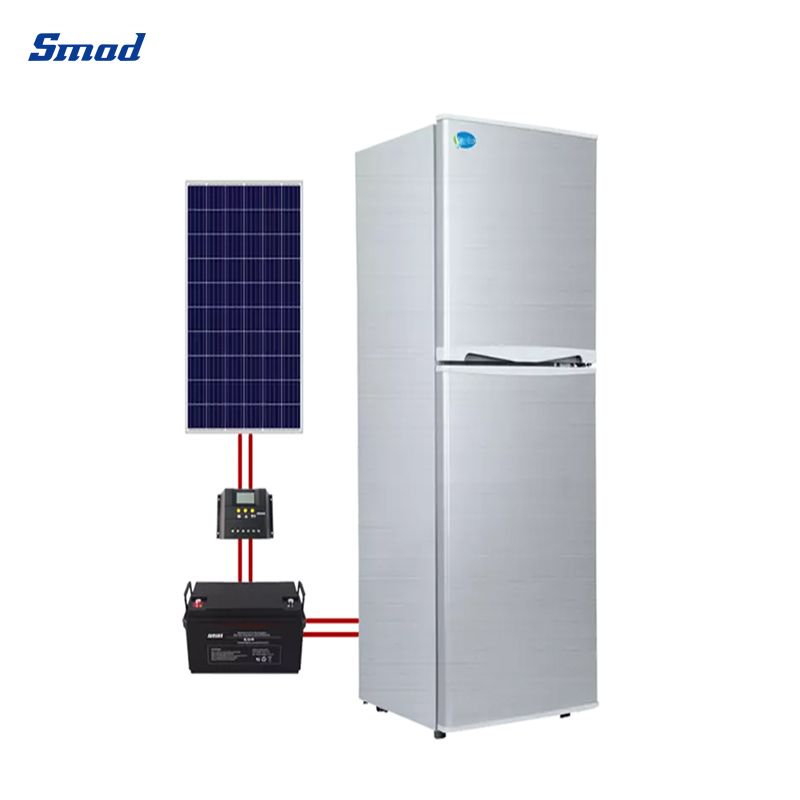Opening the Potential: How Solar Fridge Can Change Your Power Usage
The introduction of solar refrigerators provides an engaging chance to reshape our approach to power intake. By successfully utilizing sustainable solar energy, these systems assure not only to lower reliance on standard energy resources however also to boost food preservation and safety, particularly in underserved regions.
Just How Solar Refrigerators Work
Solar fridges operate by taking advantage of solar energy to power their cooling systems, properly using renewable sources to keep low temperatures. These systems commonly contain solar (PV) panels that convert sunshine right into electrical power. This power is after that used to run the compressor, fan, and other parts essential for refrigeration.
The primary mechanism in a solar refrigerator is the vapor-compression cycle, similar to standard refrigerators. In the evaporator, the refrigerant absorbs warm from the interior of the refrigerator, thus lowering its temperature.
Solar refrigerators might also integrate battery storage systems, allowing them to operate throughout non-sunny hours or in gloomy problems. This makes sure a constant cooling impact, making them appropriate for various applications, particularly in remote areas lacking access to reputable electrical energy. By integrating solar technology, these fridges add to energy efficiency and sustainability in food storage and conservation.
Secret Benefits of Solar Refrigeration
The integration of solar innovation into refrigeration systems offers numerous benefits that prolong past plain power financial savings. One of one of the most substantial benefits is the decrease of carbon impact. By utilizing renewable solar power, these systems lessen reliance on fossil gas, adding to a more lasting environment. This change is especially vital in areas where electrical power supply is unreliable or non-existent, allowing areas to preserve food preservation and security.

Additionally, the usage of solar power can bring about power freedom, allowing individuals to generate their very own power and lower vulnerability to fluctuating energy costs. Generally, the fostering of solar refrigeration provides a diverse remedy that not just addresses power consumption but additionally advertises environmental sustainability and boosts food preservation capacities in underserved areas.
Power Cost Savings and Performance
With the climbing costs of power and boosting understanding of environmental issues, power savings and efficiency have ended up being vital factors to consider in refrigeration modern technology (solar refrigerator). Solar fridges utilize eco-friendly energy sources, substantially decreasing reliance on typical electricity grids. By taking advantage of solar power, these systems lessen energy usage, making them an economically feasible choice for both household and business applications
The design of solar refrigerators includes advanced insulation materials and energy-efficient compressors, which make certain optimal efficiency while making use of marginal power. Many solar refrigerator designs also include programmable settings and clever technology that allow individuals to keep an eye on and handle power usage successfully. This smart style leads to minimized electrical energy bills and reduced operational expenses with time.
In addition, solar fridges are furnished with batteries that keep excess power produced during bright days, making it possible for constant operation also during durations of low sunlight. This capacity improves their efficiency, ensuring that food and subject to spoiling things are consistently maintained secure temperatures.
Ecological Effect and Sustainability
Using renewable energy not only enhances energy cost savings however likewise dramatically adds to ecological sustainability. solar refrigerator. Solar fridges run on clean, eco-friendly power resources, lowering dependence on nonrenewable fuel sources that add to greenhouse gas discharges. This shift in energy consumption reduces climate change impacts and cultivates a healthier planet

In addition, solar refrigerators are especially advantageous in remote locations where electrical power accessibility is limited or non-existent. By supplying a viable refrigeration option without the demand for comprehensive facilities, they advertise sustainable advancement in underserved areas. This accessibility not only boosts food security but likewise lowers food spoilage, thus lowering waste.
Picking the Right Solar Refrigerator
Selecting the excellent solar refrigerator needs mindful factor to consider of various elements to guarantee ideal efficiency and performance. Initially, evaluate the energy needs based on your usage patterns. Determine the overall power level needed to maintain your products cool down, which assists in choosing a device with a proper solar panel size to satisfy these needs.

An additional crucial facet is the sort of solar refrigerator-- compressor or absorption. Compressor versions are typically extra efficient and much better matched for environments with changing temperature levels, while absorption refrigerators might be preferable for off-grid applications because of their simpleness.
Last but not least, ensure the system has reliable solar elements, consisting of panels, batteries, and a charge controller, to ensure lasting functionality. By thoroughly thinking about these variables, you can select a solar fridge that straightens with your power objectives and contributes to sustainable living.
Final Thought
In recap, solar fridges stand for a substantial advancement in energy consumption, providing a lasting option to typical refrigeration approaches. By taking advantage of solar power, these systems not only reduce reliance on fossil fuels but likewise improve food blog safety and reduce ecological impact. The integration of advanced technologies guarantees efficiency and cost-effectiveness, promoting power freedom. As the fostering reference of solar refrigeration boosts, a transformative shift towards cleaner energy practices and reduced food waste is prepared for, contributing positively to global sustainability efforts.